|
|
|
Sort Order |
|
|
|
Items / Page
|
|
|
|
|
|
|
| Srl | Item |
| 1 |
ID:
170681


|
|
|
|
|
| Summary/Abstract |
The picture of the post-crisis world is shaped by the paradigm shifts about the sustainability of national development as a globally integrated co-development and as a necessary condition for national security and defence. Each state faces the steep task of developing new effective foreign economic policy, replacing the former export-oriented and protectionist import-substituting strategies. Such policy changes primarily concern the BRICS countries, including Russia and its place/role in expanding international trade in intermediate goods and services. Simultaneously, Russia and the BRICS must develop new mechanisms of economic cooperation between themselves in the form of global value chains (GVCs).
|
|
|
|
|
|
|
|
|
|
|
|
|
|
|
|
| 2 |
ID:
167927
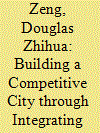

|
|
|
|
|
| Summary/Abstract |
Special economic zones (SEZs) can be an effective instrument to promote industrialisation if implemented properly. In China, starting in the 1980s, SEZs were used as a testing ground for China's transition from a planned to a market economy, and they are a prime example of China's pragmatic and experimental approach to reforms. One of the great SEZ success stories in China is the Suzhou Industrial Park (SIP), a modern industrial township developed in the early 1990s through a Sino–Singapore partnership. It is successful not just in the economic sense, but also in terms of urban and social development in an eco-friendly way. One key lesson is that in a weak market environment, a facilitating and reform-oriented host government, coupled with foreign expertise and knowledge as well as a "wholistic" approach can go a long way in leveraging economic zones to boost global value chain participation. This article is intended to examine the success factors and key lessons of the Sino–Singapore Suzhou Industrial Park, which can be useful for other developing countries.
|
|
|
|
|
|
|
|
|
|
|
|
|
|
|
|
| 3 |
ID:
159687


|
|
|
|
|
| Summary/Abstract |
The free trade agreement (FTA) between Australia and the European Union holds the promise of strengthened political collaboration and increasing economic integration. Both Australia and the European Union note increasing bilateral trade and investment. Oftentimes, data does not take current trends in global-value-chain participation for intermediary goods and services movements into account. Behind this sit the cross-border strategies and activities of business entities, whether multinationals or large, small or medium-sized enterprises. This article provides an in-depth investigation of the premise stemming from an FTA for Australian business. What advantages can politics hope to support through a business perspective? What is the global-value-chain part of the story, and what are the business challenges ahead? How can economic policy help shape this FTA to foster a productive bilateral business environment in a geopolitical and geoeconomic context in which regionalisation has taken on new momentum? Specific focus is given to the analysis of the higher education sector and to agriculture. These are two of the leading sectors in this FTA debate. Generating business value means setting negotiation agendas to target tariff and non-tariff barriers to counterbalance ambiguity in the conditions that shape the global business environment.
|
|
|
|
|
|
|
|
|
|
|
|
|
|
|
|
| 4 |
ID:
188447
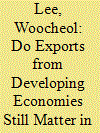

|
|
|
|
|
| Summary/Abstract |
Amid ever-growing global value chains (GVCs), a major controversial topic relates to the extent to which developing economies benefit from participating in such value chains. To measure these gains, this paper examines data pertaining to value-added in exports from three Southeast Asian economies—Malaysia, Thailand and Vietnam. The study estimates the sectoral income elasticities of the export demand of each country over the period 1980–2017, revealing that the highest income elasticities are observed in low value-adding sectors such as primary products, resource-based goods and low-tech industries. This implies that the three countries have been involved in simple and not high-skill tasks within GVCs. The paper also examines the sectoral domestic share of value-added (DVA) and foreign share of value-added (FVA) of exports of the three economies using the OECD Trade in Value-added (TiVA) database over the period 2005–15. We find that DVA in the medium- and high-tech industries that add greater value is smaller than FVA in all three countries. Overall, these results suggest that developing nations need to step up their participation in GVCs through process and/or function upgrading.
|
|
|
|
|
|
|
|
|
|
|
|
|
|
|
|
| 5 |
ID:
192852


|
|
|
|
|
| Summary/Abstract |
This study quantifies the effect of servicification on productivity using firm-level data from Indonesian manufacturing industries. The empirical strategy employed involves two procedures. The first stage is based on the estimation of productivity from the Cobb-Douglas production function using a semi-parametric method. The second stage involves regressing the derived productivity with servicification, which is proxied by the share of industrial service cost to total input and the share of service revenues to total output. The results show that servification is positively related to productivity. The study also finds evidence of the importance of firm heterogeneity, i.e., foreign ownership and participation in global value chains (GVCs) in boosting productivity.
|
|
|
|
|
|
|
|
|
|
|
|
|
|
|
|
| 6 |
ID:
147896
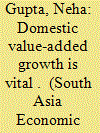

|
|
|
|
|
| Summary/Abstract |
Gains under the global value chains (GVCs) depend on how much of a country’s domestic value added (DVA) is passing onto other countries. However, India’s manufacturing sector is found to be hollowing out, that is, its DVA growth is declining. This article estimates the linkages of manufacturing sector into GVCs, focusing on machinery and textiles industries. It measures foreign value added in exports and gains under GVCs using intercountry input–output tables of OECD–WTO Trade in Value Added (TiVA) database (2015). TiVA shows a decline in India’s share of DVA exports in its gross exports. However, India has ‘net gains’ from linking into GVCs in the two industries as the ratio of forward linkages to backward linkages is greater than one. This indicates that value-added exports are greater than value-added imports. Thus, India has enough potential to compete with other countries in the upper ends of value chains in both its machinery and textiles industries.
|
|
|
|
|
|
|
|
|
|
|
|
|
|
|
|
| 7 |
ID:
178573


|
|
|
|
|
| Summary/Abstract |
In recent years, the volume and intensity of attacks on globalization have been steadily rising. It is frequently argued that the antiglobalization backlash stems from strains that have been placed on the compromise of embedded liberalism. We argue that existing research underemphasizes how technological change and the digital revolution have contributed to these strains. Global value chains facilitated by the digital revolution have linked technology in advanced industrial countries to low-cost labor in developing countries, precipitating distributional losses for low-skilled labor in the industrial world. Further, the digital revolution has led to regulatory challenges involving both capital and labor. We argue that, as a result, governments face both mounting opposition to globalization and heightened difficulty in supporting the programs and policies necessary to buffer the adverse domestic effects of globalization and maintain support for embedded liberalism.
|
|
|
|
|
|
|
|
|
|
|
|
|
|
|
|
| 8 |
ID:
165441
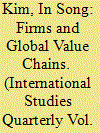

|
|
|
|
|
| Summary/Abstract |
Trade policy has become increasingly multidimensional. Current trade agreements not only address market access but also encompass rules and provisions related to flexibility of commitment, investment protection, and dispute settlement mechanisms. Yet, rigorous evidence about how interest groups evaluate each of these in relation to the others remains scarce. We develop a firm-level theoretical framework to explain how firms’ international operations affect their preferences on different trade policy measures. We experimentally evaluate preferences over multiple policy dimensions using a conjoint analysis on firms in Costa Rica. Notably, for many types of firms, the standard trade policy measures of yesteryear—tariffs and subsidies—are no longer their most important concerns. Instead, the degree of firms’ involvement in global value chains shapes their preferences. Multinational corporations care most about protection of their foreign investments. Those exporters who are not central to global supply networks most value strong dispute settlement procedures. Finally, we find that preferences over these policy dimensions are more likely to vary by firm than by industry, which calls into question the existing literature's focus on interindustry distinctions.
|
|
|
|
|
|
|
|
|
|
|
|
|
|
|
|
| 9 |
ID:
139441


|
|
|
|
|
| Summary/Abstract |
This article argues that capitalist globalization is largely responsible for creating or intensifying many of our most serious economic and social problems. It first describes the forces that drove core country transnational corporations to create a complex system of cross-border production networks. It then maps the resulting new international division of labor, in which Asian countries, especially China, import primary commodities from Latin American and sub-Saharan African countries to produce exports for core countries, especially the United States. In core countries, globalization has led to the destruction of higher paying jobs, financialization of economic activity, and stagnation. While the new international division of labor has boosted third world rates of growth, especially in Asia, it has also left the third world with unbalanced and inequitable economies. Moreover, contradictions in the globalization process point to the spread of core country stagnation to the third world. Capitalist globalization has increased third world dependence on core country consumption while simultaneously undermining core country purchasing power. The article ends by discussing a process and program of transformation that highlights the feasibility of an alternative to global capitalism as well as the organizational capacities and institutional arrangements that must be developed if we are to realize it.
|
|
|
|
|
|
|
|
|
|
|
|
|
|
|
|
| 10 |
ID:
164990
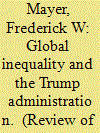

|
|
|
|
|
| Summary/Abstract |
Since US President Donald J. Trump took office in January 2017, the future of the global economy has looked distinctly uncertain. This is not because a process of clear and purposeful change can be said to be underway. Instead, it is because of a pattern of piecemeal, inconsistent and contradictory fragments of policy, both domestic and international in orientation, in the arenas of trade, taxation, business relations, finance and banking, social and welfare provision, immigration, and environmental protection, whose cumulative significance remains unclear. The modest task of this essay is therefore to sketch the contours, patterns, inconsistencies and confusions presented by the Trump administration's approach to shaping the US economy and, by extension, the global economic order, and on that basis to offer an interpretation of its emerging implications for inequality both within the United States and across the world.
|
|
|
|
|
|
|
|
|
|
|
|
|
|
|
|
| 11 |
ID:
148269
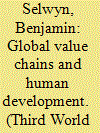

|
|
|
|
|
| Summary/Abstract |
Global Value Chain (GVC) proponents argue that regional and human development can be achieved through ‘strategic coupling’ with transnational corporations. This argument is misleading for two reasons. First, GVC abstracts firm–firm and firm–state relations from their class-relational basis, obscuring fundamental developmental processes. Second, much GVC analysis promotes linear conceptions of development. This article provides a class-relational framework for GVC analysis. The formation and functioning of GVCs and the developmental effects associated with them are products of histories of evolving, and often conflictive, class relations. A study of export fruiticulture in Northeast Brazil provides empirical support for these arguments.
|
|
|
|
|
|
|
|
|
|
|
|
|
|
|
|
| 12 |
ID:
182727
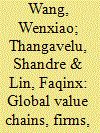

|
|
|
|
|
| Summary/Abstract |
How does participating or moving to more upstream in the global value chains (GVCs) affect the premium paid to skilled compared to unskilled labor within firms? In this paper, we develop a model of heterogeneous firms with intermediate trade and two skill inputs, in which we apply the fair wage hypothesis to predict the wage premium changes according to firms' GVCs activities. The model predicts that firms' backward GVC participation, as measured by the share of foreign value-added content in exports (FVAR), has an ambiguous impact on wage inequality of skills, which depends on the relative importance of “FVAR-labor substitution effect” and “FVAR-profit effect.” However, moving to upstream sectors in GVCs, as measured by the export varieties' upstreamness (or average distance from final use), raises a firm's wage premium. Using detailed Chinese firm-level data from 2000 to 2006, we develop a Mincer-type empirical model to study the wage premium changes associated with FVAR and upstreamness. We find robust empirical evidence that the rise of wage inequality in China mainly arises from moving to more upstream sectors rather than changing GVC participation.
|
|
|
|
|
|
|
|
|
|
|
|
|
|
|
|
| 13 |
ID:
077670


|
|
|
|
|
| Publication |
2007.
|
| Summary/Abstract |
The failure of Japanese electronics firms to participate fully in the Internet-fueled growth of the global electronics industry during the late 1990s triggered a period of questioning among top executives. This article examines Japanese managerial responses to the organizational model "value chain modularity," which was deployed by the US electronics firms driving the creation of the Internet. While there were partial but significant steps taken in the direction of this new US model-increased specialization, outsourcing of low-end products, and shared factory investments in Japan -wholesale restructuring was resisted. This evidence is consistent with larger patterns of gradual institutional change in Japan . I argue that the result of this process will likely be increased, not diminished, institutional diversity over time. While globalization has accelerated the pace of change by opening new avenues for organizational experimentation and institutional layering, the drag on organizational change exerted by existing institutions slows the process enough to allow institutional and organizational innovations to develop into coherent systems with distinct characteristics. The result, inevitably, will be a uniquely Japanese approach to the challenges posed by globalization.
|
|
|
|
|
|
|
|
|
|
|
|
|
|
|
|
| 14 |
ID:
160572


|
|
|
|
|
| Summary/Abstract |
This research note presents a new dataset on the speed of tariff liberalization in sixty-one preferential trade agreements (PTAs) signed by fifty states and regional economic organizations over the period 1995 to 2013. We use this dataset to test prominent arguments concerning the impact of intra-industry trade and global value chains on the political economy of trade. Our results indicate that the speed of tariff liberalization through PTAs is considerably faster for intermediate goods than for finished products. This is in line with the most prominent argument about how global value chains affect the political economy of trade liberalization. At the same time, we find mixed evidence for the impact of intra-industry trade on the ease of trade liberalization, which reflects strong cross-country variation. We conclude with a discussion on how the dataset can help tackle important questions in international political economy and inform ongoing debates on trade agreements.
|
|
|
|
|
|
|
|
|
|
|
|
|
|
|
|
| 15 |
ID:
087430
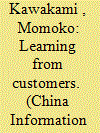

|
|
|
|
|
| Publication |
2009.
|
| Summary/Abstract |
This article explores the firm-level competitive edge that underlies the dominance of Taiwanese manufacturers in the global production of notebook PCs. Based on the study of the business flow of original design manufacturing trade and the author's interviews with outsourcing and subcontracting firms, the article argues that the successful formation of multifaceted capabilities in product development, mass production, and logistics, as well as the creation of information advantages, underpin the drastic rise of Taiwan's position in the global competitive landscape. The article also examines the mechanism through which such firm-level competitiveness has been created, and it argues that the unique attributes of the notebook PC value chains have allowed Taiwanese firms to effectively absorb technology, know-how, and information by interacting with and learning from a wide variety of customers, and thus enhance their competitiveness as original design manufacturing suppliers.
|
|
|
|
|
|
|
|
|
|
|
|
|
|
|
|
| 16 |
ID:
192854
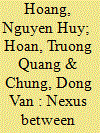

|
|
|
|
|
| Summary/Abstract |
This study aims to empirically explore the nexus between foreign direct investment (FDI) and other factors for global value chain (GVC) participation (backward and forward) in Vietnam, a transitional economy. The estimation shows that the economic size and market development of Vietnam and its trading partners are the main determinants of the nation's GVC participation. Inward FDI flows into the country have a positive impact on its GVC participation in both forward and backward linkages. Geographical distance is an impediment to Vietnam's backward GVC participation, whilst engagement in free trade agreements is advantageous to its GVC participation in both backward and forward linkages. We find that the logistics performance of Vietnam and its trading partners also positively affects the country's GVC participation. The paper provides policy implications for Vietnam to better use FDI and other factors to enhance its GVC participation, such as by attracting large supplier firms in upstream industries across the multinational enterprises' (MNEs) value chains, promoting trade liberalization and improving logistical efficiency.
|
|
|
|
|
|
|
|
|
|
|
|
|
|
|
|
| 17 |
ID:
153850
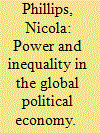

|
|
|
|
|
| Summary/Abstract |
Inequality in all its forms is the defining global problem and increasingly the defining political problem of our age. A monumental body of scholarly research seeks to understand the drivers behind the vast and accelerating patterns of socio-economic inequality in the global political economy. This article, an adapted version of the 2016 Martin Wight Memorial Lecture, contributes to this effort by focusing on a dimension of the picture which has received surprisingly little attention, namely, the implications for socio-economic inequality of the particular form of industrial organization that has come to underpin the contemporary global economy—one organized around global value chains and global production networks. It proposes an approach which sees inequality as arising at the intersections of three dimensions of asymmetry—asymmetries of market power, asymmetries of social power and asymmetries of political power—which underpin and crystallize around global value chains. It explores these dynamics in the particular arena of labour and labour exploitation in global value chains, as a means of shedding a valuable wide-angle beam on the big questions of power and inequality in the contemporary global political economy.
|
|
|
|
|
|
|
|
|
|
|
|
|
|
|
|
| 18 |
ID:
157885
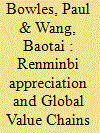

|
|
|
|
|
| Summary/Abstract |
China has experienced a rapid integration into Global Value Chains and a decade long appreciation of its exchange rate. However, these trends have been analysed largely in isolation from each other. In this paper, we explore the linkages between the two based on interviews with a sample of firms in Jiangsu Province. We show (1) how the distribution of the costs and benefits of exchange rate appreciation depends on the power hierarchies between firms in GVCs; (2) how exchange rate changes are important drivers of upgrading and even downgrading in GVCs; and (3) that the firm heterogeneity evident in GVCs provides additional insights into the politics of exchange rate determination in China.
|
|
|
|
|
|
|
|
|
|
|
|
|
|
|
|
| 19 |
ID:
167874
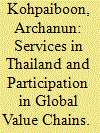

|
|
|
|
|
| Summary/Abstract |
This paper examines the services sector in Thailand with a focus on regional and global value chains, highlighting the case of the logistics sector. Overall, the results indicate that in Thailand, services exhibit relatively low labour productivity as compared to other sectors. The logistics sector, however, is well integrated into global value chains with links to prominent multinational firms. The findings also suggest that many opportunities lie ahead for Thai firms to move up regional and global value chains.
|
|
|
|
|
|
|
|
|
|
|
|
|
|
|
|
| 20 |
ID:
183434
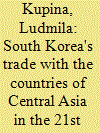

|
|
|
|
|
| Summary/Abstract |
The author studies the structure and dynamics of trade between South Korea and Central Asia from 2000 to 2019. The existing trade turnover is unbalanced with an outdated trade structure: South Korean exports of manufactured goods predominate in mutual trade flows, while Central Asia main exports are primary commodities and raw materials. The Central Asian republics' low involvement in global value chains is the main reason for the existing inefficient trade and greatly hinders the development of investment cooperation. The implementation of reforms by Central Asian countries will contribute to the development of other trade areas and economic relations, while promoting diversification of the structure of trade with South Korea.
|
|
|
|
|
|
|
|
|
|
|
|
|
|
|
|
|
|
|
|
|